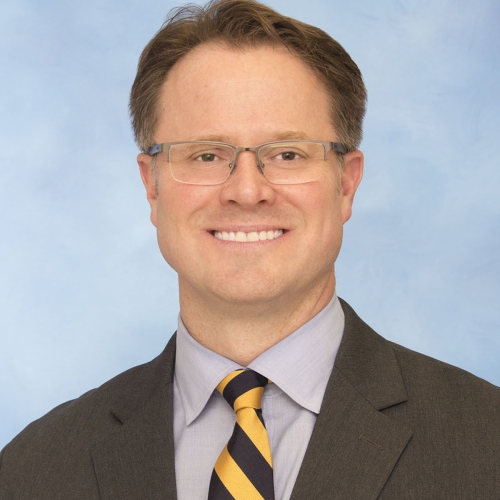
Available to mentor

Gregory Basura, MD, PhD is an associate professor surgeon-scientist in the Division of Otology/Neurotology-Skull Base Surgery in the Department of Otolaryngology-Head and Neck Surgery at the University of Michigan. With a fifty percent research appointment in the Kresge Hearing Research Institute (KHRI), Dr. Basura divides his time between patient care, basic science/human translational clinical research, resident/medical student teaching, administrative/committee, institutional service, student mentoring and global outreach/humanitarian efforts.
Dr. Basura’s clinical practice includes all aspects of otology/neurotology including hearing loss, chronic ear disease, facial nerve, and vestibular disorders, complex lateral skull base and temporal bone tumors to include schwannomas, glomus tumors and cutaneous malignancy. In additional to a thriving cochlear implant practice, he also treats advanced skull base problems including superior semi-circular canal dehiscence syndrome, skull base cerebrospinal fluid leaks and temporal lobe encephaloceles. Dr. Basura’s practice includes chronic ear surgery for cholesteatoma, facial nerve tumors, and surgery for vestibular disorders. As a skull base and vestibular schwannoma center of excellence, Dr. Basura employs complex approaches to the inner ear, lateral skull base and brainstem including the trans-labyrinthine, middle cranial fossa and internal auditory canal dissection via the retro-sigmoid approach.
Basic Science Research Role:
Dr. Basura’s research interests include both basic science animal and human translational studies of tinnitus and single-sided deafness, both of which are challenging and common clinical problems. Using animal models of tinnitus and single-sided deafness, he has investigated multisensory integration (e.g., cross-modal plasticity of auditory cortex with somatosensory and visual systems) in the modulation of central auditory pathways following noise-induced tinnitus and single-sided deafness. His previous collaborations in KHRI employed extracellular in vivo electrophysiology recordings to understand how non-auditory systems (e.g., somatosensory, and visual) modulate neural firing properties in auditory cortex neurons. This research helped to elucidate central neural origins of tinnitus percepts and brain plasticity following sudden unilateral (single-sided) deafness. Dr. Basura’s basic science work has been published in high-profile journals with numerous citations and has been funded by foundational (Deafness Research Foundation), governmental (NIH R03, R21) and clinical organizational (Clinician-Scientist Developmental Award sponsored by the American Otological Society) grant awards.
Clinical Research Role:
Dr. Basura’s clinical/translational human research capitalizes on his basic science work and clinical practice expertise. He is currently using functional near-infrared spectroscopy (fNIRS), a type of non-invasive neuroimaging technology, to measure brain activity and plasticity in humans with tinnitus and single-sided deafness. This work has yielded several key seminal high-profile publications and many national and international presentations and a recently funded “high risk” NIH R21 grant for new technology development in collaboration with Biomedical/Electrical Engineering at UM. The goal of this work is to advance existing fNIRS technology using highly innovative adaptations of the traditional fNIRS probes to gain better understanding of central auditory nervous system dysfunction to diagnose and treat disorders such as tinnitus and deafness that involve human central auditory circuits.
Lastly, Dr. Basura has collaborated with now retired colleague Dr. Susan Shore. That work garnered several grants (as co-investigator) to assist in the development and implementation of a non-invasive auditory-somatosensory delivery device (Coulter Foundation) to treat human tinnitus. Dr. Basura served as a co-lead lead clinician on a recently completed NIH-Clinical Trials R01 Grant to treat human tinnitus (PI, Shore). His clinical-translational human research has been published in several high-profile journals (e.g., PLOS One, Neural Plasticity and Science Translational Medicine).
Dr. Basura’s long-term goals for patient care are to continue to develop improved algorithms based on his research for improved management of temporal bone malignancy and cranial base tumors. For research, his goal is to continue to independently fund human and basic science as the primary investigator and lead on clinical trials to improve our understanding and treatments for tinnitus and single-sided deafness. For humanitarian outreach/service and teaching, Dr. Basura’s goal is to contribute to international populations to help improve clinical and research independence in otology and to assist in the expansion and further development of the recently minted one-year dedicated otology clinical/surgical fellowship at the University of Cape Town in South Africa with fellowship director, Dr. Tashneem Harris. He has also established the African Otological Society (www.afotos.org) to build otology and audiology capacity and community in Africa.
-
Center MemberKresge Hearing Research Institute
-
Hershey E, Chionis L, Kazemi R, Valenzuela C, El-Kashlan HK, Basura GJ, Stucken EZ. Otol Neurotol, 2024 Apr 1; 45 (4): e337 - e341.Journal ArticleChanging Management of Intravestibular Schwannomas in the Era of Cochlear Implantation for Single-Sided Deafness.
DOI:10.1097/MAO.0000000000004140 PMID: 38361345 -
Patel TR, Prince ADP, Benjamin WJ, Basura GJ. Laryngoscope Investig Otolaryngol, 2023 Dec; 8 (6): 1637 - 1647.Journal ArticleRole of the otologist/neurotologist in managing auricular and periauricular cutaneous malignancies: A 10-year otologic oncology experience.
DOI:10.1002/lio2.1171 PMID: 38130268 -
Prince M, Basura G, Senior B, Sebelik M. 2023 Oct 4;PresentationExpanding Humanitarian Medical Educational Outreach Using Bi-directional Approaches
-
Jones GR, Martel DT, Riffle TL, Errickson J, Souter JR, Basura GJ, Stucken E, Schvartz-Leyzac KC, Shore SE. JAMA Netw Open, 2023 Jun 1; 6 (6): e2315914Journal ArticleReversing Synchronized Brain Circuits Using Targeted Auditory-Somatosensory Stimulation to Treat Phantom Percepts: A Randomized Clinical Trial.
DOI:10.1001/jamanetworkopen.2023.15914 PMID: 37266943 -
Aural Rehabilitation Clinical Practice Guideline Development Panel , Basura G, Cienkowski K, Hamlin L, Ray C, Rutherford C, Stamper G, Schooling T, Ambrose J. Am J Audiol, 2023 Mar; 32 (1): 1 - 51.Journal ArticleAmerican Speech-Language-Hearing Association Clinical Practice Guideline on Aural Rehabilitation for Adults With Hearing Loss.
DOI:10.1044/2022_AJA-21-00252 PMID: 36374028 -
Basura G. 2023 Mar;PresentationBuilding Sustainable Medical and Educational Partnerships
-
Basura G, Patel T. 2023 Neurotology,ChapterSurgery for Vestibular Disorders
-
Basura G, Patel T. 2023 The Open Access Atlas of Otolaryngology, Head and Neck Operative Surgery,ChapterSurgical Management of Auricular and Peri-Auricular Cutaneous Maligncy